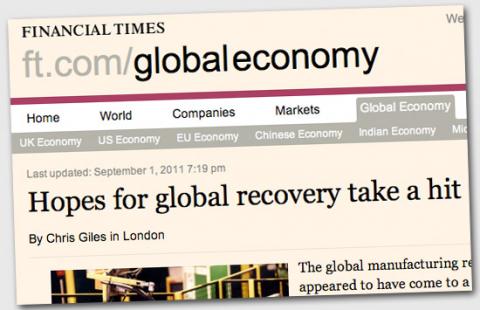Outlook still bleak for our broken economic system

With traditional policy options exhausted, and the economic outlook still very bleak, many are beginning to question the system of free markets that has brought such misery. By Vincent Browne.
In the myriad coves and harbours of the Mediterranean coastline in the less salubrious part of southern France (from where this column is being drafted, the area around Perpignan down to the Spanish border), there are many thousands of expensive boats moored, reflecting the massive wealth of the French elite, a wealth no doubt diminished by the financial crisis but still enormously substantial.
Coincidentally, a report showed that half of the French population live on incomes of less than €19,000 a year.
Liliane Bettencourt is one of the richest people in France. She is also one of the 15 billionaires who signed an open letter to Nicolas Sarkozy in the last few weeks, urging that she and her wealthy friends be taxed more than they are, in preference to cutting public expenditure which mainly affects the less well-off.
Warren Buffett, one of the wealthiest people in the world, complained in the New York Times recently that the US Congress had long ‘‘coddled’’ billionaires like himself, and it was time to cease this and raise taxes on the rich.
In Germany, a new organisation, Vermögende für eine Vermögensabgabe (the Wealthy for a Capital Levy), has been formed. Its members demand that they too be taxed more. In that country, the top tax rate is 42%, having been cut by the ‘socialist’ government of Gerhard Schröder from 53%, the rate imposed by the government of Helmut Kohl, the ‘conservative’!
Even the chairman of Ferrari, Luca di Montezemolo, is urging Silvio Berlusconi to raise taxes on billionaires like himself in Italy. In Britain, the Conservative/Lib Dem government is baulking, for now, at reducing the top rate of income tax from 50%. In Spain, the social democrat candidate to lead the next government, Alfredo Rublacaba, is promising to raise income tax if his party is re-elected.
But in Ireland, there are no such demands, and our ‘centre-left’ government is resolute that there will be no increase in income tax, even through the top rate is just 42% - bolstered, admittedly, by the Universal Social Charge, but still lower than many very successful EU countries.
At the same time, the government is planning to raise Vat, which inevitably most affects the poorer sections of society.
There is an appreciation, it seems, among the rich elsewhere that the world is in the midst of the most serious crisis for a long time. Harvard economist Kenneth Rogoff argues it is misleading to talk about a ‘‘double-dip’’ recession, and that we are in the midst of the ‘‘second great contraction’’, the first being the 1929-1933 recession/depression.
From a perusal of the international press, there is a sense that traditional policy options have been exhausted. Interest rates are (almost) as low as they can be, and stimulus hasn’t worked - or can’t work because of fiscal crises. There is also a sense of a leadership vacuum in the US: a bewildered Obama is weakened by a Congress that wants him to fail, even if it means America fails, and in Europe, there is a dysfunctional EU. (Wasn’t the Lisbon Treaty intended to deal with that dysfunction?)
All across the capitalist world, the economic prognosis is bleak. Stagnation in America, slower growth than projected in Europe’s largest economy, Germany, and stagnation everywhere else in Europe, including Britain.
Last Friday, the Financial Times ran an article headlined: ‘Hopes of a global recovery take a hit’.
It said: ‘‘The global manufacturing recovery appeared to have come to a grinding halt in August . . .Across Asia, Europe and the US, surveys of purchasing managers produced the lowest readings of manufacturing activity and orders since mid-2009, when the world economy was only crawling out of recession.”
Some commentators argue that Ireland is defying the global doom, and the Financial Times - this time in an editorial on ‘The Irish Patient’ last Friday - pointed out that we had the highest unemployment since records began in 1967, more than one in ten mortgages were in arrears or had been restructured, domestic demand was unable to propel economic growth and the banks still relied on massive cash infusions from the ECB.
Nevertheless, Minister for Finance Michael Noonan was right in asserting that Ireland was making ‘‘considerable progress’’.
Which raises the question: how bad would it have to be for us not to be making ‘‘considerable progress’’?
Last autumn, we were being told there would be ‘‘lift-off’’ this year. Now there’s to be no lift-off this year or next year, according to the ESRI - and that is from the worst contraction in any economy in the developed world.
Many around the world are asking how the economic system that has brought such misery to the ‘‘developed world’’, and even more to the ‘‘underdeveloped world’’, is still the favoured system of almost the entire planet.
Surely we should be questioning the rationale of a system that is founded on the free interplay of markets, which then causes systemic collapse and imposes the gigantic losses generated by these markets on those most victimised by these same markets from the outset.
This is a system that generates huge inequalities in wealth, income, power and even life expectancy.
